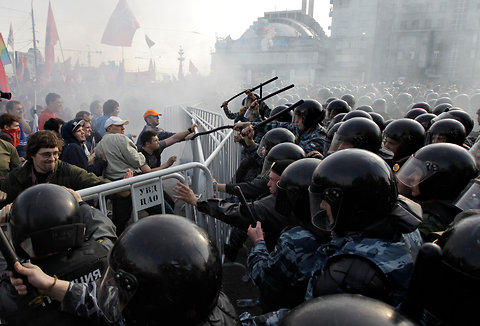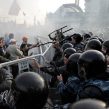
Putin Begins the Countdown of His Rule
Publication: Eurasia Daily Monitor Volume: 9 Issue: 86
By:

Vladimir Putin’s presidential inauguration has taken place today in the Kremlin with all the ceremonial pomp and fanfare that is supposed to create the impression of invincibility of his quasi-monarchic reign. Later this week, he will appoint Dmitri Medvedev as the Prime Minister in acknowledgement of his loyal service in the presidential position for the last four years. He will also announce the make-up of the next cabinet of ministers, ending the seven-month-long period of bureaucratic anxiety, and command the resumption of business as usual. Yet, three events have marred the solemnity of the day and revealed that Putin’s trademark “stability” is in fact a fiction, camouflaging deep troubles in the Russian state. The first one was the opposition march to Bolotnaya Square, which was supposed to be a replay of the cheerful winter rallies but turned out to be much angrier and was forcefully dispersed by the thousands of OMON and police forces gathered in Moscow for the occasion. The second event was the “day of bears” at the Moscow stock exchange where the two key indexes (MMVB and RTS) lost 3.6 and 4.0 percent, respectively, last Friday. The third blemish was the most tragic one – two suicide explosion rocked Makhachkala, Dagestan on May 3, killing 14 people.
The opposition rally was called the “March of Millions.” Yet, despite the ambitious name, only perhaps some 50,000 people gathered, determined to make the point that Putin was not their president (Newsru.com, May 6). The moderate strength does not signify that the “white opposition” that suddenly came into existence last December has dissipated; its aim has never been to stage a revolution and capture power. Now the movement’s many leaders have to figure out how to bring the despised regime to a non-violent end (Gazeta.ru, May 3). Liberal-minded urban middle classes understand the need to connect with the discontent among the “have-nots,” but the leftist rallies on May 1 did not look pretty (Grani.ru, May 3). Nevertheless, Moscow anti-Putinists work hard to build networks in the regions and to organize several parties on the principles of solidarity rather than competition, while the legion of bloggers is relentless in revealing the lies of official propaganda. Putin wants to dismiss this opposition as a spent force but he is also worried about its hidden strength, so he issued the last-minute instruction to his Popular Front to stage a counter-rally – and ordered the police to get tough with the Bolotnaya protesters (Lenta.ru, May 5).
The sell-off at the Moscow stock exchange was not as massive as at the end of last September (which coincided with Putin’s announcement of taking back the presidential job), but it has wiped away all the modest gains from the start of the year and signaled the progressing weakness of the Russian economy (Kommersant, May 5). Best expert predictions presume growth of 3-4 percent, but it requires an investment boom, while in April yet another massive outpouring of capital was registered (New Times, April 23). A very probable drop in oil prices remains an uncontrollable threat, and even on the current high plateau revenues are too low to sustain Putin’s electoral commitments. Therefore, Putin is forced to push Gazprom to pay more taxes, which goes against his dearest “values” (Gazeta.ru, May 3). The President is very reluctant to curtail social programs, dares not to increase the pension age and cannot check bureaucratic predation, thus boxing the economics of Putinism into a politically constructed blind alley.
The dilemma of diminishing resources and expanding commitments looms large in the North Caucasus, and the bombings in Makhachkala reminded the leadership about the potential consequences of this deadlock (Moskovsky Komsomolets, May 5). In the election campaign, the smoldering civil war in the eastern part of this region was a non-issue because Moscow is happy to forget about terrorism and considers the weekly shoot-outs and explosions to be “local peculiarities.” Chechnya, Dagestan and Ingushetia exist in their own political space, so the opposition in Moscow pays no attention to their above 90 percent voting for Putin; local activists, meanwhile, have more pressing concerns than to protest against this blatant fraud (Moskovskie Novosti, May 5). Putin’s vision for this zone of deepening disaster goes no further than to suppress and bribe the rebellion for two more years so that Sochi will be safe to host the 2014 Winter Olympic Games (Gazeta.ru, April 28). The problem with this goal-setting is not its short-termism but the implicit acceptance of the prospect of escalation of violence. The Kremlin is helpless to alter the brutally despotic nature of the regimes that it has created.
What makes Putin so arrogantly confident despite these ominous signs at the start of his new term is his successful prevention of a split in the political elite, which appeared very probable last autumn. Nobody in the government followed Aleksei Kudrin’s example in refusing to work in Medvedev’s cabinet. But the former finance minister was always a special case, underpinned not only by his professional authority but also by his long friendship with Putin (Polit.ru, April 20). Nobody in big business expressed support for Mikhail Prokhorov’s campaign. The vast majority of businessmen are so deeply involved with the ruling bureaucracy and with various clans of siloviki – who also saw the need for a ceasefire in their many feuds – that taking chances in opposing the regime was out of the question. Reducing Medvedev to the role of the first among loyal courtiers, Putin has stifled all dissent in the Kremlin corridors and regained control over the ever-proliferating intrigues (Vedomosti, May 5).
Celebrating the moment, Putin assumes that he has started a long countdown for the six years of the undivided and unchallenged rule, but his days in the Kremlin could turn out to be much shorter. He is so obviously devoid of new ideas amidst astounding changes and so antagonized from the urban “creative classes” – the only members of Russian society who could make use or at least sense of these changes – that the embarrassing obsolescence becomes the worst enemy of his patriarchic regime. Medvedev has successfully compromised the idea of “modernization,” but Putin’s conservatism is a fake ideology of going nowhere and doing nothing. Russia cannot afford to waste years with this self-appointed and self-serving camarilla. The country is in search of a way to rid itself of it – and its patience has a tendency of evaporating most abruptly.




